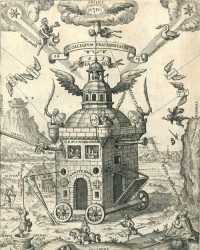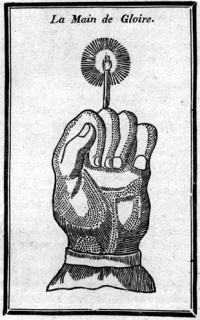Western esotericism
From The Art and Popular Culture Encyclopedia


|
Related e |
|
Featured: |
- Western esotericism
The term Esotericism refers to the doctrines or practices of esoteric knowledge, or otherwise the quality or state of being described as esoteric, or obscure. Esoteric knowledge is that which is specialised or advanced in nature, available only to a narrow circle of "enlightened", "initiated", or highly educated people. Items pertaining to Esotericism may be known as Esoterica. Some interpretations of esotericism are very broad and include even unconventional and non-scientific belief systems. In contrast, exoteric knowledge is knowledge that is well-known or public.
Etymology
Plato, in his dialogue Alcibíades (circa 390 BC), uses the expression ta esô meaning "the inner things", and in his dialogue Theaetetus (circa 360 BC) he uses ta exô meaning "the outside things". Aristotle applied this distinction to his own writings. The probable first appearance of the Greek adjective esôterikos is in Lucian of Samosata's "The Auction of Lives", § 26, written around AD 166.
The term esoteric first appeared in English in the 1701 History of Philosophy by Thomas Stanley, in his description of the mystery-school of Pythagoras; the Pythagoreans were divided into "exoteric" (under training), and "esoteric" (admitted into the "inner" circle). The corresponding noun "esotericism" was coined in French by Jacques Matter in 1828 and popularized by Eliphas Levi in the 1850s. It entered the English language in the 1880s via the works of theosophist Alfred Sinnett.
History
Since esotericism is not a single tradition but a vast array of often unrelated figures and movements, there is no single historical thread underlying them all. The developments that one might wish to emphasize in drawing up a history of esotericism furthermore depends on whether esotericism in the dictionary (non-scholarly) or the scholarly sense is intended.
Several historically attested religions emphasize secret or hidden knowledge, and are thus esoteric in the dictionary sense, without necessarily being esoteric movements in the scholarly sense of the word. Thus, the Roman Empire had several mystery religions which emphasized initiation. Some saw Christianity, with its ritual of baptism, as a mystery religion. None of these are "esoteric" in the scholarly sense. The terms "Gnosticism" and "Gnosis" refer to a family of religious movements which claimed to possess secret knowledge (gnosis). Another important movement from the ancient world was Hermeticism or Hermetism. Both of these are often seen as precursors to esoteric movements in the scholarly sense of the word.
Non-Western traditions can also display the characteristics of esoteric movements. The Ismaili Muslims also stress a distinction between the inner and the outer. It is believed that spiritual salvation is attained by receiving the 'Nur' (light) through the "esoteric", that is, spiritual search for enlightenment. Ismaili Islam also has some of the characteristics associated with esotericism as defined by Faivre, e.g. the belief in an intermediate spiritual sphere mediating between humans and the divine. In order to distinguish esoteric currents based primarily on sources from late Antiquity and the European Middle Ages, from e.g. Islamic or Jewish currents with similar features, the more precise term "Western esotericism" is often employed.
Western esoteric movements in the scholarly sense thus have roots in Antiquity and the Middle Ages. A major phase in the development of Western esotericism begins in the Renaissance, partly as the result of various attempts to revive such earlier movements. During the Italian Renaissance, for example, translators such as Ficino and Pico della Mirandola turned their attention to the classical literature of neo-Platonism, and what was thought to be the pre-Mosaic tradition of Hermeticism. Other pursuits of Antiquity that entered into the mix of esoteric speculation were astrology and alchemy. Beside such revived currents from late Antiquity, a second major source of esoteric speculation is the kabbalah, which was lifted out of its Jewish context and adapted to a Christian framework by people such as Johannes Reuchlin. Outside the Italian Renaissance, yet another major current of esotericism was initiated by Paracelsus, who combined e.g. alchemical and astrological themes into a complex body of doctrines.
In the early 17th century, esotericism is represented by currents such as Christian Theosophy and Rosicrucianism. A century later, esoteric ideas entered various strands of Freemasonry. Later in the 18th century, as well as in the early 19th century, the diffuse movement known as Mesmerism became a major expression of esotericism. In the 19th century, esotericism is also represented e.g. by certain aspects of the philosophy, literature and science associated with Romanticism, by spiritualism, and by a notable French wave of occultism.
The major exponent of esotericism in the latter part of the 19th century is the Theosophy of H. P. Blavatsky, not to be confused with the Christian Theosophy mentioned above. In the 20th century, Theosophy was reformulated by Annie Besant, C. W. Leadbeater, Alice Bailey, Rudolf Steiner and many others, and became the source for a whole range of post-theosophical movements such as The Summit Lighthouse. A particularly successful post-theosophical movement is Anthroposophy, a synthesis of occultist, Christian and neo-Platonic ideas with Western esoteric concepts as formulated in the wake of Theosophy. Anthroposophy, which was founded by Rudolf Steiner in the early part of the 20th century, includes esoteric versions of education, agriculture, and medicine.
Yet another notable esoteric strain stems from the teachings of G. I. Gurdjieff and P. D. Ouspensky.
Theosophy is also considered a major influence on the many less institutionally organized varieties of esotericism in metaphysical milieus, "Ascended Master Activities", and within the New Age.
Finally, it can be noted that Carl Gustav Jung, can be seen as an exponent of esotericism: his writings concern esoteric subject such as alchemy, and rephrased the concept of correspondences in a modern, psychologizing terminology in his theory of synchronicity.
See also
- Archeosophy
- Behmenism
- Clairvoyance
- Esoteric Buddhism
- Esoteric Christianity
- Esoteric cosmology
- Esoteric healing
- Esotericism in Germany and Austria
- Freemasonry
- Huna
- Illuminati
- Karma
- List of Buddhist topics
- List of spirituality-related topics
- List of religious, esoteric, metaphysical and mystical symbols
- Magic and religion
- Martinism
- Merkabah
- Mysticism
- New World Order
- Numerology
- Obscurantism
- Occult
- Odic force
- Plane (esotericism) (Planes of existence)
- Qigong
- Reincarnation
- Scientology
- Spiritual evolution
- Spirituality
- Telepathy
- Western Esotericism (academia)
- Western mystery tradition


